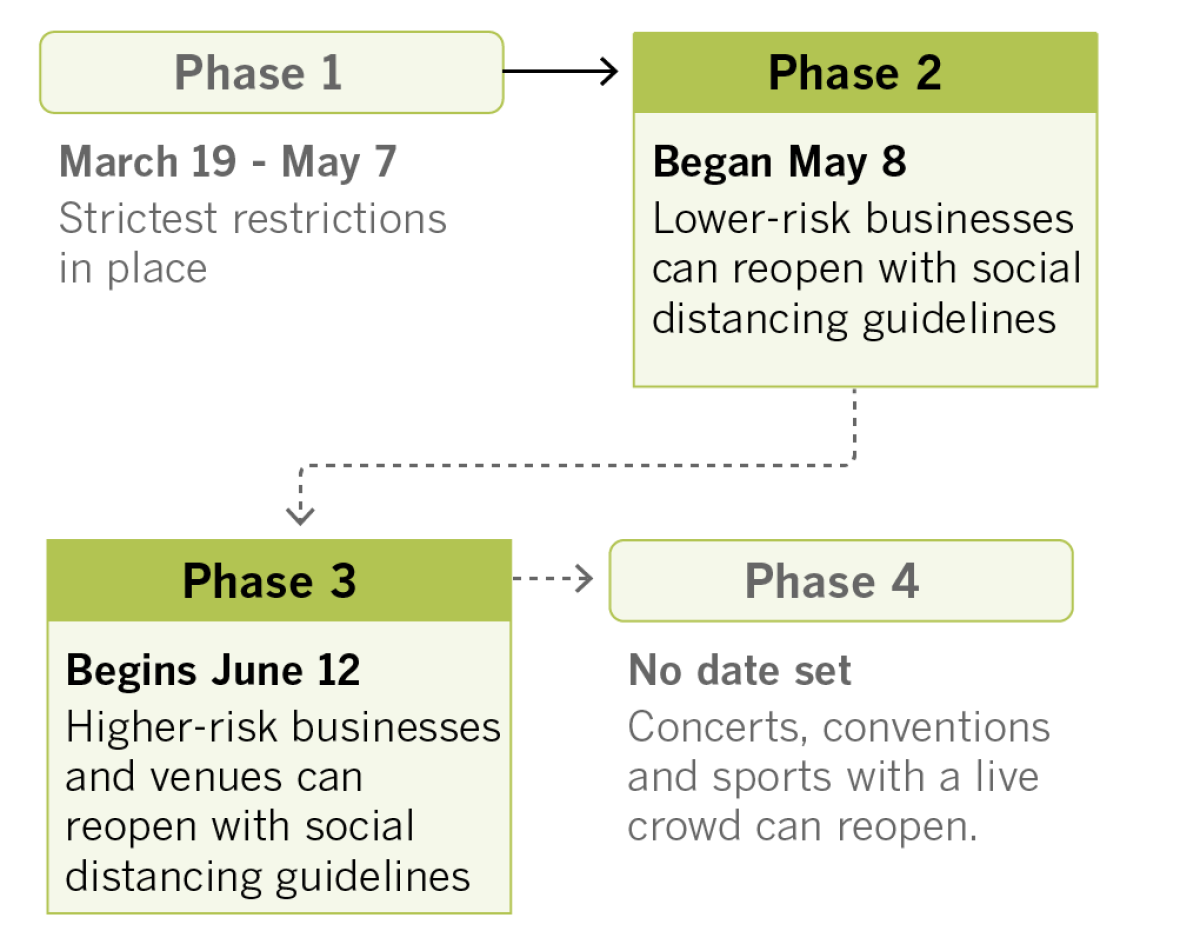Coronavirus Today: The sports challenge
- Share via
Good evening. I’m Diya Chacko, and it’s Tuesday, May 26. Here’s what’s happening with the coronavirus in California and beyond.
Some parts of California are officially transitioning to Phase 3 of reopening. Hair salons and barber shops can resume service as long as counties meet certain criteria and require shops to take precautions, Gov. Gavin Newsom announced Tuesday. “By no stretch of the imagination is this virus behind us,” he said.
Los Angeles County, which still accounts for the bulk of the state’s cases and more than half of its deaths, will be slower to reopen than other parts of the state. But it is allowing houses of worship, flea markets, housing-complex pools, drive-in movie theaters and in-store shopping at low-risk retail stores to reopen with restrictions, county officials said Tuesday. Also Tuesday, Los Angeles Mayor Eric Garcetti announced that all retail stores in the city can let customers inside starting Wednesday, as long as they adopt the county’s safety protocols.
The data back up officials’ continued caution. Confirmed cases are still on the rise, and health officials are warning Californians about the dangers of silent spread as they leave their homes to dine in restaurants, shop in stores and visit beaches and parks. Experts say presymptomatic transmission of the virus is possible in the few days between the time a person becomes infected and the point at which they begin to show signs of illness. There’s also asymptomatic transmission, in which infected people show no serious signs of illness but still can spread the disease.
As the sports industry looks to the post-pandemic future, athletes young and old are grappling with major challenges ranging from the economic to the psychological. With games and on-campus classes canceled, international athletes at UCLA and USC are deciding whether or not to wait out the pandemic in the U.S. Some are making their way back to their home countries as borders begin to reopen, even if it means two weeks of forced isolation before they can see their families. “I’m going to get out of here,” said a men’s water polo player who went into isolation after returning to Montenegro, “and I’m going to squeeze my mom, my sister and my family as hard as I can.”
The NHL has unveiled its plan to finish the 2019-20 season, confirming a 24-team restart format that won’t include the Kings or Ducks, effectively ending their seasons. Meanwhile Major League Baseball players and team owners are trying to hammer out agreements over pay during the 2020 season. Players’ agents have taken on expanded roles as their clients worry about the future of their careers, with many finding themselves providing the latest health information and offering advice to draft prospects about whether or not to stay in school. “I’m kind of like a paid therapist,” said a player representative for Creative Artists Agency.
Anti-doping authorities are worried that the use of performance-enhancing drugs will rise as programs stop monitoring athletes in an effort to keep them from coming into close contact with testers. Some have expressed concern about suspended cheaters who would have missed the 2020 Tokyo Olympics but will regain eligibility in time for the postponed Summer Games in 2021. As countries emerge from lockdown, the World Anti-Doping Agency said it hopes to make up for lost time with the creation of a strategic testing group.
In our “Season Interrupted” series, The Times is interviewing high school seniors whose athletic careers are now on hold. Here’s what these talented teens have to say about how they’re dealing with it all, and what they hope the future brings.
By the numbers
California cases and deaths as of 4 p.m. PDT Tuesday:
Track the latest numbers and how they break down in California with our graphics.

See which counties are reopening with our tracker.
Across California
Illicit underground parties are being thrown in short-term rental homes across the Hollywood Hills, forcing the LAPD’s Hollywood Division to field a steady stream of complaints of music and voices at all hours of the night. Authorities are threatening to hold the homeowners responsible. “If your house has been cited for a party violation in the past, you as a property owner can be held responsible even if you are not present,” a city prosecutor said.
The union representing workers at a Vernon meatpacking plant has called for its immediate closure, saying there was no evidence that measures were being taken to control the spread of the virus. At least 153 workers at the Farmer John plant, a division of Smithfield Foods, have come down with COVID-19; outside of nursing homes and prisons, it’s the largest outbreak in Los Angeles County. County supervisors on Tuesday gave local health officials and plant operators one week to review worker safety protocols and report back.
The city of Los Angeles has opened its largest coronavirus testing site at Dodger Stadium, where up to 6,000 people can be tested daily. The drive-through facility will offer video demonstrations on how to administer a self-test to help prepare those waiting in line. If you’re a resident of L.A., you can find a testing site or sign up for a test by calling (213) 978-1028 or visiting the city’s coronavirus website.
Resources
— For general safety, wash your hands for at least 20 seconds (here’s a super-fun how-to video). Stop touching your face, and keep your phone clean. Practice social distancing, maintaining a six-foot radius of personal space in public. And wear a mask if you leave home. Here’s how to do it right.
— Watch for symptoms including fever, cough, shortness of breath, chills, repeated shaking with chills, muscle pain, headache, sore throat and loss of taste or smell. If you’re worried you might be infected, call your doctor or urgent care clinic before going.
— Here’s how to care for someone with COVID-19, from monitoring their symptoms to preventing the virus’ spread.
— If your job has been affected by the coronavirus pandemic, here’s how to file for unemployment.
— Here are some free resources for restaurant workers and entertainment industry professionals having trouble making ends meet.
— Advice for helping kids navigate pandemic life includes being honest about uncertainties, acknowledging their feelings and sticking to a routine. Here’s guidance from the Centers for Disease Control and Prevention.
— In need of mental health services? Here are resources for coping during the crisis from the CDC and the L.A. County Department of Public Health. L.A. County residents can also call (800) 854-7771 or text “LA” to 741741.
Around the nation and the world
The gaps in the U.S. healthcare system are growing more pronounced as tens of millions of Americans lose jobs and health coverage. States that expanded their safety nets through the Affordable Care Act are in better shape than those that didn’t, and many people in red states like Texas have been left uninsured and afraid to seek care because of financial constraints. “We’re about 15 years behind California in terms of taking on costs in a meaningful way,” said the head of the Texas Academy of Family Physicians.
The Supreme Court on Tuesday turned down an appeal from Trump administration lawyers who sought to block the release of Ohio prisoners at high risk for COVID-19. The disease has torn through correctional facilities across the U.S., with thousands of inmates testing positive to date. Although this appeal was denied, the court left the door open for another.
Shanghai Disneyland has become the first Disney park to reopen, since China’s coronavirus infection and death numbers have dwindled to the point where authorities deemed it safe. Though the park’s official capacity is 80,000 visitors per day, only 24,000 will be allowed in. Visitors must maintain a certain distance from each other while waiting in line, and they’ll have to keep their masks on. “I almost couldn’t breathe,” said an 8-year-old parkgoer who participated in a “Frozen” sing-along while wearing a mask. “But it was worth it.”

Your questions answered
Today’s question comes from readers who want to know: If I get the coronavirus, am I supposed to tell my apartment neighbors? Housing reporter Liam Dillon asked some experts.
People who have been in close contact with someone who has tested positive for the coronavirus need to know. So if you are infected and you’ve been in close contact with your neighbors, you should tell them.
One way to make the situation less stressful is to address possible scenarios with your neighbors ahead of time. If you live in a small apartment complex where tenants are friendly, have a group discussion about everyone’s comfort levels with notifying each other and/or the landlord.
You can also talk about what help you might need if you end up self-isolating in your apartment, a USC immunology professor suggested.
Your landlord doesn’t need to know if you have the coronavirus, but they should be urged to “provide cleaning supplies and otherwise provide protections for their tenants,” the professor said.
To prevent the spread of infections — even if you don’t know whether someone has the virus — wear masks in public areas, wash hands regularly and limit what you touch in common areas such as elevators and laundry rooms.
Got a question? Our reporters covering the coronavirus outbreak want to hear from you. Email us your questions, and we’ll do our best to answer them. You can find more answers in our Frequently Asked Questions roundup and in our morning briefing.
For the most up-to-date coronavirus coverage from The Times, visit our homepage and our Health section, listen to our “Coronavirus in California” podcast and follow us on Twitter and on Instagram.





